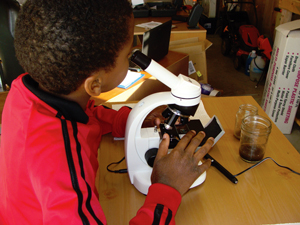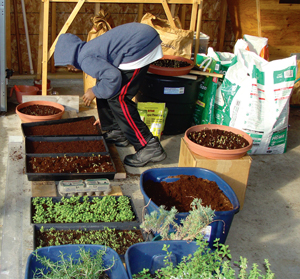
HOUSTON (FinalCall.com) – When reviewing lists of the “most popular” majors selected by incoming college students throughout America, agriculture is hardly mentioned or pursued by this generation.
Omari Muhammad, a college sophomore, is determined to help change the aversion his peers have towards this field that is necessary for the survival of all people.
“I believe most young people don’t have a true understanding of the importance of agriculture. Plus most of us run away from something that involves getting our hands dirty yet the things we eat come from the land,” said Omari Muhammad, who is majoring in animal science at Prairie View A&M University (PVAMU), a HBCU located 45 miles west of Houston.
Omari Muhammad developed an affinity for agriculture while working on a farm every summer owned by his grandparents. He decided to pursue it in college and is presently taking courses such as agriculture marketing management.
“I don’t see a lot of young people flocking to this major versus other majors. We need more of our experienced Black farmers to go into the middle schools and high schools to teach us early about why we can’t survive without farming. This may help to increase the number of college students pursuing it,” opined Omari Muhammad, who also serves as president of the PVAMU chapter of the Nation of Islam Student Association.

For the past few months, the importance of land ownership has been an on-going theme in recent messages and radio interviews by the Honorable Minister Louis Farrakhan. In his appearance at PVAMU on Nov. 9 he even suggested that anyone majoring in sociology or psychology should change their major right away.
Janice Henderson, who is majoring in psychology at a local community college, was in the audience when he said that. She got slightly offended but understood his point.
“I will admit he has me thinking about why I even chose psychology as a major and what direction I’m going to take once I graduate. He’s right in that there aren’t a lot of opportunities out there in my major but I’m just not a land type of person,” Ms. Henderson said with a smile.
“However, I come from a family that owns a lot of land and has lost a lot of it too due to not paying back taxes. We’ve grown a lot of food and it is better for your health to eat from your own gardens and farms. I’m thankful for Minister Farrakhan’s message that night because I now want to do more than just have a job. I want to own something,” she said.
According to the Texas Forest Service, approximately four million acres of land have been scorched over the last year by nearly thirty thousand wildfires. Yet, the state’s agriculture department reported recently that its $100 billion agricultural industry still leads the nation in the production of cattle and cotton.
Harry Lewis, a 65-year-old experienced Black dairy farmer in Sulphur Springs, Texas, owns over 200 acres of land and stresses that agriculture is not as “boring” as some young people may think.
“Agriculture is more than just milking cows. There are so many avenues you can pursue in this field such as organic farming and marry it with the latest technologies,” said Mr. Lewis, who now produces and markets hay.
“It’s an exciting feeling to be able to own land and produce food, shelter, and clothing for your family and your people. We as a people have to get back to the soil,” he said.
Where’s the next generation of farmers?
In a Nov. 23 interview on KPFT’s “Connect the Dots” with host Robert Muhammad, Minister Farrakhan responded to a question from a listener as to why farming is not appealing to Blacks.
“People left the South in droves, finding refuge in the North; finding work in factories. And they turned their backs on the land. They turned their back on farming. They turned their back on agriculture,” said Min. Farrakhan.
“Today, farming has a lowly status in the minds of the people but the farm is the engine of every society. You have nothing if you don’t have a farmer. From the earth is where everything comes and the tilling of the ground is what God made man to do. When God gives you earth it is your duty as a producer to till the ground and bring out the richness that is in the ground to produce products. That is what makes you fit for life itself,” said Min. Farrakhan.
Min. Farrakhan also said on the show that he was happy to hear that some of the students at PVAMU changed their majors to agriculture after seeing him speak.
“Because of what they see on television, more of our young Black people lean more towards being an athlete, singer and entertainer because it’s more stylish than being a farmer. But agriculture is the most important profession,” said Mr. Lewis.
According to Dr. Ridgely A. Muhammad, farm manager of a 1,600 acre farm in southwest Georgia owned by the Nation of Islam, less than 4 percent of the Black farmers in America are under the age of 35.
“Students pick other majors in hopes of getting an easy job where they can make more money, wear a nice suit and sit at a desk every day. That’s the total opposite of farming which involves harder work, getting dirty, dealing with hot and cold temperatures, and making very little money per hour,” said Dr. Muhammad, who heads the NOI Ministry of Agriculture.
When researching what Whites say about why they get into farming, Dr. Muhammad said “they emphasized that it represents freedom and also they feel a sense of accomplishment by producing things from the land. We have to continue educating our people that we are at the mercy of others as long as we don’t control land and produce for ourselves.”
For the past years, Dr. Muhammad has hosted numerous schools at Muhammad Farms to show students the art of farming. This same hands-on experience is being consistently offered at Pure Milk Farms in Winnie, Texas, where students have learned to produce cheese, butter, yogurt, and more from raw milk.
“The key in getting our young people more interested in agriculture early in life has been bringing them to the land. Children are very analytical so bringing them to the farm beats watching a video or even reading a book,” said Kelvin Muhammad, who helps manage Pure Milk Farms.
“Black farmers have almost become nonexistent so we’re in dire need of young people to step into this field and take it to the next level of production. If they don’t, we’re in trouble as a people,” said Mr. Lewis.












